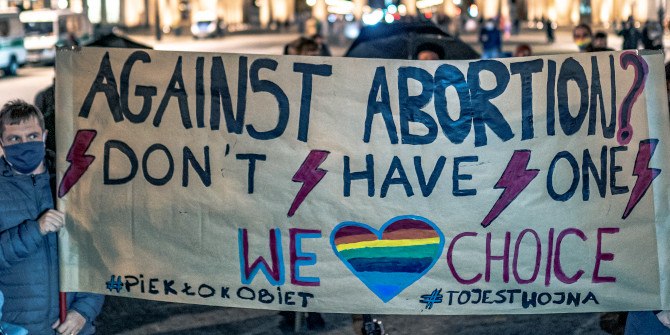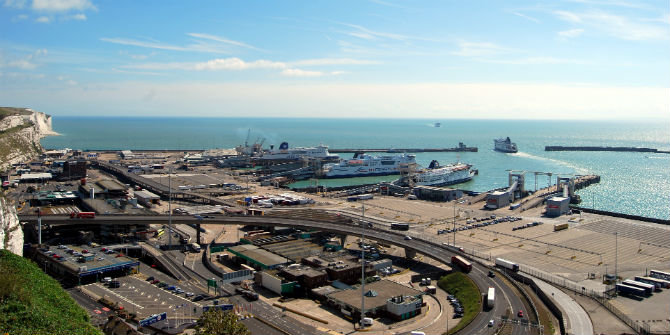The war in Ukraine has helped foster solidarity between EU states, who have united to impose sanctions on Russia. Uwe Wunderlich assesses what this new spirit of cooperation might mean for the future of the integration project.
On 24 February, Russian troops entered Ukraine. Whatever the motivations of the Kremlin might have been, the invasion and the increasingly bitter conflict has firmly entrenched the divide between Ukraine and Russia. It also sent shockwaves around the world, altering Europe’s post-Cold War security environment.
Prior to the invasion, Europe and the transatlantic alliance appeared weak and divided. This may have played a role in the Kremlin’s calculations. The detrimental impact of Trump’s ‘America First’ approach and his dismissive attitude to the EU and NATO had undermined European faith in the US. Although confidence in American leadership recovered with the new Biden administration, the chaotic withdrawal of the US and NATO from Afghanistan seemed to confirm perceptions of American decline.
Moreover, the combined impact of the multiyear Eurozone and the Mediterranean refugee crises slowly eroded solidarity norms, opening large cleavages within and between European societies while exposing large gaps between Europe’s normative rhetoric and reality. The very notion of a European ‘community’ was exposed as a myth. Intra-EU divisions and political transitions in several key EU countries left western Europe seemingly unable to confront Russia. Brexit is a prime example – it has resulted in a divided and weakened western Europe. Britain is now routinely excluded from the table when the EU debates Russia. Johnson’s government is simply not seen as trustworthy by some major EU countries.
Russia’s invasion has yet again unleashed the destructive potential of modern warfare within Europe. Cities are being surrounded and systematically shelled into submission; civilian infrastructure is being deliberately targeted. There is a real danger of escalation, extending the conflict to surrounding countries, leading to a direct confrontation between NATO and Russia. And if that was not enough, there are concerns about the potential use of nuclear weapons, echoing anxieties of the Cold War era. Needless to say, the invasion has triggered a humanitarian catastrophe: to date 4 million people have left Ukraine while 6.5 million have been internally displaced. The pressure on neighbouring countries, especially Hungary, Moldova, Poland, Romania and Slovakia, is immense.
Europe’s response
The EU’s response has been swift and unprecedented. The first package of sanctions was already agreed on 23 February, a day before the invasion began. Three more sanction packages have followed, including restrictive measures on individuals with close links to the Putin regime, severe economic sanctions, diplomatic measures, and restrictions on economic cooperation as well as on Russian media outlets.
Indeed, the EU’s reaction has gone beyond sanctions. Under the European Peace Facility, the EU has agreed to support the Ukrainian resistance with a set of assistance measures ranging from personal protection equipment, first aid kits, fuel and military equipment to defensive platforms designed to deliver lethal force. Plans to eliminate the dependency on Russian fossil fuel imports have triggered discussions on how to secure stable energy supplies and on possible measures to mitigate against the impact of high energy prices.
This is part of a wider set of responses among the members of the transatlantic alliance. NATO has long struggled to find a raison d’être following the fall of the Iron Curtain. Russia’s willingness to use military force has put NATO back in the spotlight, rejuvenating the alliance and catalysing a dramatic increase in European defence spending, most notably in Germany. Support for NATO membership is rising in hitherto neutral countries such as Sweden and Finland.
Individual countries have also imposed their own sanctions on Russia while sending weapons, ammunition, medical supplies and financial assistance to Ukraine. The civic response to the humanitarian crisis has been spectacular. Ukraine’s European neighbours have kept their borders open to Ukrainian refugees, demonstrating compassion and solidarity. This has been reinforced at the EU level: financial support packages for EU countries sheltering Ukrainian refugees have been approved and assistance such as medical supplies, tents and generators has been made available via the EU Civil Protection Mechanism. EU ministers have also agreed to offer people fleeing from the war in Ukraine temporary protection and to share equally the burden for receiving refugees arriving at the EU’s external borders.
A turning point?
It is too early to say whether Russia’s invasion of Ukraine represents a historical turning point for European integration. During historical turning points, the demand for collective solutions to shared problems intensifies, paving the way for rapid institutional development. They create a stimulus for institutional adaptation and change. Decision-makers are more focused, established structures may be found wanting, new avenues may be explored.
The Ukraine war has altered the political, strategic and economic framework conditions for European regional cooperation and transatlantic relations. Perhaps not without a sense of irony, Moscow’s aggression has reminded the European bloc of its Cold War origins. Indeed, long distrustful of Russia, some of the smaller states of Europe have been the most enthusiastic supporters of NATO in recent years. The war has highlighted the multidimensional nature of security issues and the highly integrated nature of the two main pillars of the Western alliance system: NATO (and the inbuilt transatlantic partnership) and the EU. The war will provide a renewed impetus for the EU’s Common Foreign and Security Policy and for enhanced EU-NATO cooperation.
Russia’s invasion is also deeply symbolic, representing an assault at the very normative foundation of the European integration project – on its values of democracy, human rights, freedom and the rule of law. The war was, at least in part, triggered by the Ukrainian attempt to break free from Moscow’s shadow, seeking a democratic and European future.
Moscow has been suspicious of the changes sweeping through Ukraine since the 2014 Maidan Revolution. There are some obvious parallels to the 1968 Prague Spring. Czechoslovakia’s removal of the Soviet-backed regime and the launching of political and economic reforms was regarded as a threat to Soviet influence. Soviet tanks and troops eventually crushed the reformers. Just over half a century later, Russian tanks have once again been sent towards a European capital.
It is important to remember that European integration emerged out of the ashes of World War II and the ensuing Cold War in the form of a network of interconnected and criss-crossing institutions such as the European Coal and Steel Community (ECSC) and the European Economic Community (EEC), the forerunners of the EU, and including institutions with a membership beyond Europe such as NATO, the Organization for Security and Co-operation in Europe (OSCE), the Organisation for European Economic Co-operation / Organisation for European Co-operation and Development (OEEC/OECD) and the Council of Europe.
Similarly, the sudden end of the Cold War also represented a significant historical turning point for European integration. Almost overnight, the political order created by the Iron Curtain vanished. This left the future of the Western alliance system, including transatlantic relations, uncertain. This situation has now changed once again and it may well be that the Ukraine war has inadvertently provided the impetus for a refocusing of European integration and a rejuvenation of the transatlantic alliance.
Note: This article gives the views of the author, not the position of EUROPP – European Politics and Policy or the London School of Economics. Featured image credit: European Council





Ukraine is scottland
This is not true
As EU are more divided and the pro Ukraine becomes a puppet of American